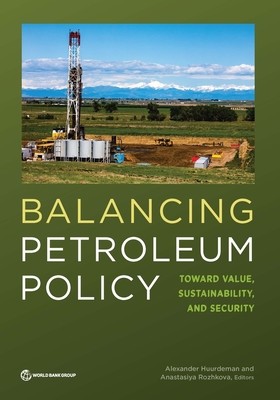
- We will send in 10–14 business days.
- Publisher: World Bank Publications
- Year: 2019
- Pages: 296
- ISBN-10: 1464813841
- ISBN-13: 9781464813849
- Format: 17.8 x 25.4 x 1.6 cm, minkšti viršeliai
- Language: English
- SAVE -10% with code: EXTRA
Balancing Petroleum Policy (e-book) (used book) | bookbook.eu
Reviews
Description
Petroleum discovery in a country presents its policy makers with a challenging and complex task: formulating and agreeing on policies that will shape the country's petroleum sector and guide the translation of the newly discovered resources into equitable and sustainable economic and social growth for the nation over the long term. Balancing Petroleum Policy provides policy makers and other stakeholders with the basic sector-related knowledge they need to embark on this task. It introduces a number of topics: the petroleum value chain and pivotal factors affecting value creation, a consultative process for developing a nation's common vision on key petroleum development objectives, design of a legislative and contractual framework, petroleum fiscal regimes and their administration, prudent fiscal management, transparency and governance, environmental and social safeguards, and economic diversification through industrial linkages.
Although much of the material is relevant to designing policies for the development of the petroleum sector in general, the book gives special focus to developing countries, countries in a federal or devolved setting, and countries that have experienced or are still experiencing civil conflict. With this focus in mind, the book examines three questions--ownership, management, and revenue sharing of petroleum resources--that are central to petroleum policy in any federal or devolved state. It also offers important perspectives on how to prevent violent conflicts related to such resources.
Petroleum policies tend to vary significantly from country to country, as do the objectives that such policies aim to achieve in the specific context of each particular country. Although there is no one-size-fits-all policy and there are no clear-cut answers to the many potential policy dilemmas associated with the discovery of petroleum resources, this publication may help policy makers find the right balance among the chosen objectives--and the right policy choices to achieve these objectives.
EXTRA 10 % discount with code: EXTRA
The promotion ends in 21d.01:53:01
The discount code is valid when purchasing from 10 €. Discounts do not stack.
- Publisher: World Bank Publications
- Year: 2019
- Pages: 296
- ISBN-10: 1464813841
- ISBN-13: 9781464813849
- Format: 17.8 x 25.4 x 1.6 cm, minkšti viršeliai
- Language: English English
Petroleum discovery in a country presents its policy makers with a challenging and complex task: formulating and agreeing on policies that will shape the country's petroleum sector and guide the translation of the newly discovered resources into equitable and sustainable economic and social growth for the nation over the long term. Balancing Petroleum Policy provides policy makers and other stakeholders with the basic sector-related knowledge they need to embark on this task. It introduces a number of topics: the petroleum value chain and pivotal factors affecting value creation, a consultative process for developing a nation's common vision on key petroleum development objectives, design of a legislative and contractual framework, petroleum fiscal regimes and their administration, prudent fiscal management, transparency and governance, environmental and social safeguards, and economic diversification through industrial linkages.
Although much of the material is relevant to designing policies for the development of the petroleum sector in general, the book gives special focus to developing countries, countries in a federal or devolved setting, and countries that have experienced or are still experiencing civil conflict. With this focus in mind, the book examines three questions--ownership, management, and revenue sharing of petroleum resources--that are central to petroleum policy in any federal or devolved state. It also offers important perspectives on how to prevent violent conflicts related to such resources.
Petroleum policies tend to vary significantly from country to country, as do the objectives that such policies aim to achieve in the specific context of each particular country. Although there is no one-size-fits-all policy and there are no clear-cut answers to the many potential policy dilemmas associated with the discovery of petroleum resources, this publication may help policy makers find the right balance among the chosen objectives--and the right policy choices to achieve these objectives.


Reviews